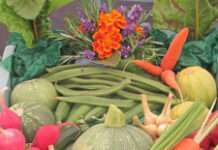University celebrates its leadership in food science
MANHATTAN, Kan. – The World Health Organization estimates that more than 600 million people worldwide suffer from foodborne illness each year. More than 450,000 die as a result of that illness.
So, it makes sense to bring awareness to foodborne illness year-round, even though June 7 is being celebrated globally as World Food Safety Day.
“The aim of World Food Safety Day is to expose people to the importance of having a safe food supply in terms of food security and public health for people around the world,” said Kansas State University food scientist Randy Phebus.
The Food and Agriculture Organization of the United Nations and the World Health Organization initiated World Food Safety Day in 2018 to raise awareness of the global burden of foodborne diseases.
The event is now held on June 7 each year. Phebus said this is the first year that K-State has formally participated, though the university’s Food Science Institute plans to take part in all future events.
“When you talk to people from different parts of the world, you quickly realize that there are different perspectives on what the priorities are for food safety,” Phebus said. He pointed to a portion of a video produced by K-State in which food science student Karina Desiree, from Indonesia, remembers teaching her mother how to use a refrigerator to store food.
“In the United States, we take that for granted, right?” Phebus said. “These are the types of things that World Food Safety Day tries to highlight…what is important across the world.”
Carla Schwan is a post-doctoral researcher in K-State’s food safety and defense laboratory. Schwan took the lead in organizing K-State’s activities to promote World Food Safety Day, with one highlight being a video montage of several graduate students from around the world describing what food safety means to them personally.
In her native Brazil, Schwan notes that sometimes her own family questions why they should follow certain food safety practices, often believing they are safe because they have “done it all our lives this way.”
“Sometimes we take things for granted,” Schwan said. “But food is a primary fuel for our bodies, and if we can not consume safe and nutritious foods, that impacts our ability to absorb nutrients, and consequently affects our growth and development.”
The work done by food scientists at K-State and around the world, she added, “helps to make sure that kids all around the world are consuming safe foods, which is extremely important for short- and long-term benefits, such as better health and nutrition, improved school attendance, just to name a few.”
Phebus lauded K-State’s efforts in food science during his 30-year career at the university. He cites K-State’s commitment to building facilities, hiring faculty and working across disciplines as keys to its contributions to promoting food safety from the time the crop is planted in the field to the time it hits the consumer’s plate.
For example, during the COVID-19 pandemic, K-State received a grant for $1 million from the U.S. Department of Agriculture to study controls for the virus in meat and poultry processing operations.
“That’s not a food safety issue, per se; it’s a public health and worker protection issue,” Phebus said. “But if we’re shutting down plants or slowing down processing lines, it can definitely impact the food safety aspects of consumer products being manufactured.”
Schwan is among many K-State researchers who work on projects in developing countries, many of those funded through the U.S. Agency for International Development. She notes that the work she has done in Cambodia, for example, translates to helping improve safety in Cambodia and many other countries.
Phebus notes: “Our work at K-State is all integrated, working with people in many expertise areas. It makes it exciting to work in food science, and I think it draws students to us.”
# # #
Sidebar:
Food safety around the world
Here is what some K-State food science students are saying about food safety in their country:
Karina Desiree, Indonesia
When I think about food safety, I think about the time I taught my mom how to use the fridge properly to store food. That’s when I realized that a big part of food safety is education and awareness.”
Dan Vega, Costa Rica
“For me, food safety is making sure that what we’re feeding everybody is not going to cause them any harm or disease when they eat the food product.”
April Molitor, United States
“Food safety impacts public health in a variety of ways, ranging from short-term illnesses to long-term complications. And food safety issues can be especially dangerous for people in a more vulnerable category, such as young people, old people, pregnancy and immune-compromised.”
Baheeja Zaitoun, Palestine
“Is food safety important? Yes, it is, because following good food safety guidelines would prevent foodborne illness, eliminating costs both on the side of the patient and health care.”
Zilfa Yrakoze, Rwanda
“When I think about food safety, what comes to my mind are all of the practices that are put into the protection of food against microbial contamination, all the way from the farm throughout the food supply chain, to the people consuming the food.”
Kellen Habib, United States
“Food safety impacts public health by ensuring that the products we eat are clean before they get to you, and that can help to reduce the amount of diseases that are transmitted through our food and reduce the amount of doctor’s visits we need to make for foodborne illness.”
Gunvantsinh Indrasinh Rathod, India
“Food safety is important to us because food is the primary requirement for the human body. What we eat should be a safe food; it should be free from bacteria or any pathogen or any harmful substance that makes you sick.”
Erin Manville, United States
“Food safety is important because it offers consumers confidence in the foods they are eating. You can just go to a grocery store and buy something and there is no concern that you are going to get sick, or have any ailment from that food. You can just comfortably eat it.”
FOR PRINT PUBLICATIONS: Links used in this story
World Health Organization, https://www.who.int
World Food Safety Day, https://www.who.int/news-room/campaigns/world-food-safety-day/2021
Food and Agriculture Organization of the United Nations, http://www.fao.org/home/en
Video: Safe Food Now for a Healthy Tomorrow, https://www.youtube.com/watch?v=7XhbOtiqsVI
Video: COVID-19 and Food Safety, https://www.ksre.k-state.edu/news/stories/2020/11/research-aims-to-protect-workers-in-processing-facilities.html
K State Research and Extension is a short name for the Kansas State University Agricultural Experiment Station and Cooperative Extension Service, a program designed to generate and distribute useful knowledge for the well being of Kansans. Supported by county, state, federal and private funds, the program has county extension offices, experiment fields, area extension offices and regional research centers statewide. Its headquarters is on the K State campus in Manhattan. For more information, visit www.ksre.ksu.edu. K-State Research and Extension is an equal opportunity provider and employer.
Written by:
Pat Melgares
785-532-1160
melgares@ksu.edu
For more information:
Randy Phebus
785-532-1215
phebus@ksu.edu





